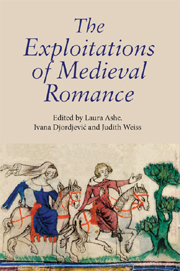Book contents
- Frontmatter
- Contents
- Preface
- Notes on Contributors
- Abbreviations and Editorial Note
- Introduction
- 1 The Fairies in the Fountain: Promiscuous Liaisons
- 2 Saracens and Other Saxons: Using, Misusing, and Confusing Names in Gui de Warewic and Guy of Warwick
- 3 The Exploitation of Ideas of Pilgrimage and Sainthood in Gui de Warewic
- 4 Chanson de geste as Romance in England
- 5 Patterns of Availability and Demand in Middle English Translations de romanz
- 6 Reading a Christian–Saracen Debate in Fifteenth-Century Middle English Charlemagne Romance: The Case of Turpines Story
- 7 Subtle Crafts: Magic and Exploitation in Medieval English Romance
- 8 Meeting Grounds: Gardens in Middle English Romance
- 9 ‘Als for the worthynes of þe romance’: Exploitation of Genre in the Buik of Kyng Alexander the Conquerour
- 10 Sir Gawain and the Green Knight and the Limits of Chivalry
- Index of Manuscripts
- General Index
6 - Reading a Christian–Saracen Debate in Fifteenth-Century Middle English Charlemagne Romance: The Case of Turpines Story
Published online by Cambridge University Press: 12 September 2012
- Frontmatter
- Contents
- Preface
- Notes on Contributors
- Abbreviations and Editorial Note
- Introduction
- 1 The Fairies in the Fountain: Promiscuous Liaisons
- 2 Saracens and Other Saxons: Using, Misusing, and Confusing Names in Gui de Warewic and Guy of Warwick
- 3 The Exploitation of Ideas of Pilgrimage and Sainthood in Gui de Warewic
- 4 Chanson de geste as Romance in England
- 5 Patterns of Availability and Demand in Middle English Translations de romanz
- 6 Reading a Christian–Saracen Debate in Fifteenth-Century Middle English Charlemagne Romance: The Case of Turpines Story
- 7 Subtle Crafts: Magic and Exploitation in Medieval English Romance
- 8 Meeting Grounds: Gardens in Middle English Romance
- 9 ‘Als for the worthynes of þe romance’: Exploitation of Genre in the Buik of Kyng Alexander the Conquerour
- 10 Sir Gawain and the Green Knight and the Limits of Chivalry
- Index of Manuscripts
- General Index
Summary
After a crushing defeat of Christian forces at Kosovo in 1448 by Sultan Murad II, Constantinople fell in 1453 to Murad's son, the ambitious Mehmed II, who styled himself as a new Caesar and continued to move into Serbia, Hungary, and ultimately even parts of Italy. The advance of the Ottoman Turks into the borderlands of western Europe was a pressing foreign policy issue for late-medieval Christian Europe. To fifteenth-century readers of the exploits of Charlemagne in the chansons de geste, however, these disastrous losses could sound a familiar tune, the prelude, in fact, to a song of Christian victory over the fearsome Saracen invaders:
Some men loveth to here tell
Of doughty knyghtes that were fell […]
And some of venterous knyghtes olde
That for our Lorde dyde fyght –
As Charles dyde, that noble Kynge,
That hethen downe dyde brynge,
Thrughe the helpe of God almyghty.
He wanne fro the hethen houndes
The spere and nayles of Crystes woundes,
And also the crowne of thorne –
And many a ryche relyke mo
Mawgré of them he wanne also,
And kylled them even and morne.
The Turkes and the paynyms bolde
He felled doune many a folde;
Durst none stande hym beforne.
Charles gan them so affraye
That the catyves myght curse the daye
And the tyme that they were borne!
Now Machamyte, that Turke untrue
To our Lorde Cryst Jhesu,
And to His lawe also,
Many Crysten man slayne hath he.
- Type
- Chapter
- Information
- The Exploitations of Medieval Romance , pp. 90 - 107Publisher: Boydell & BrewerPrint publication year: 2010



